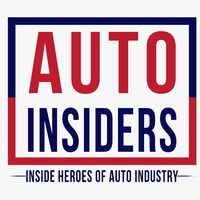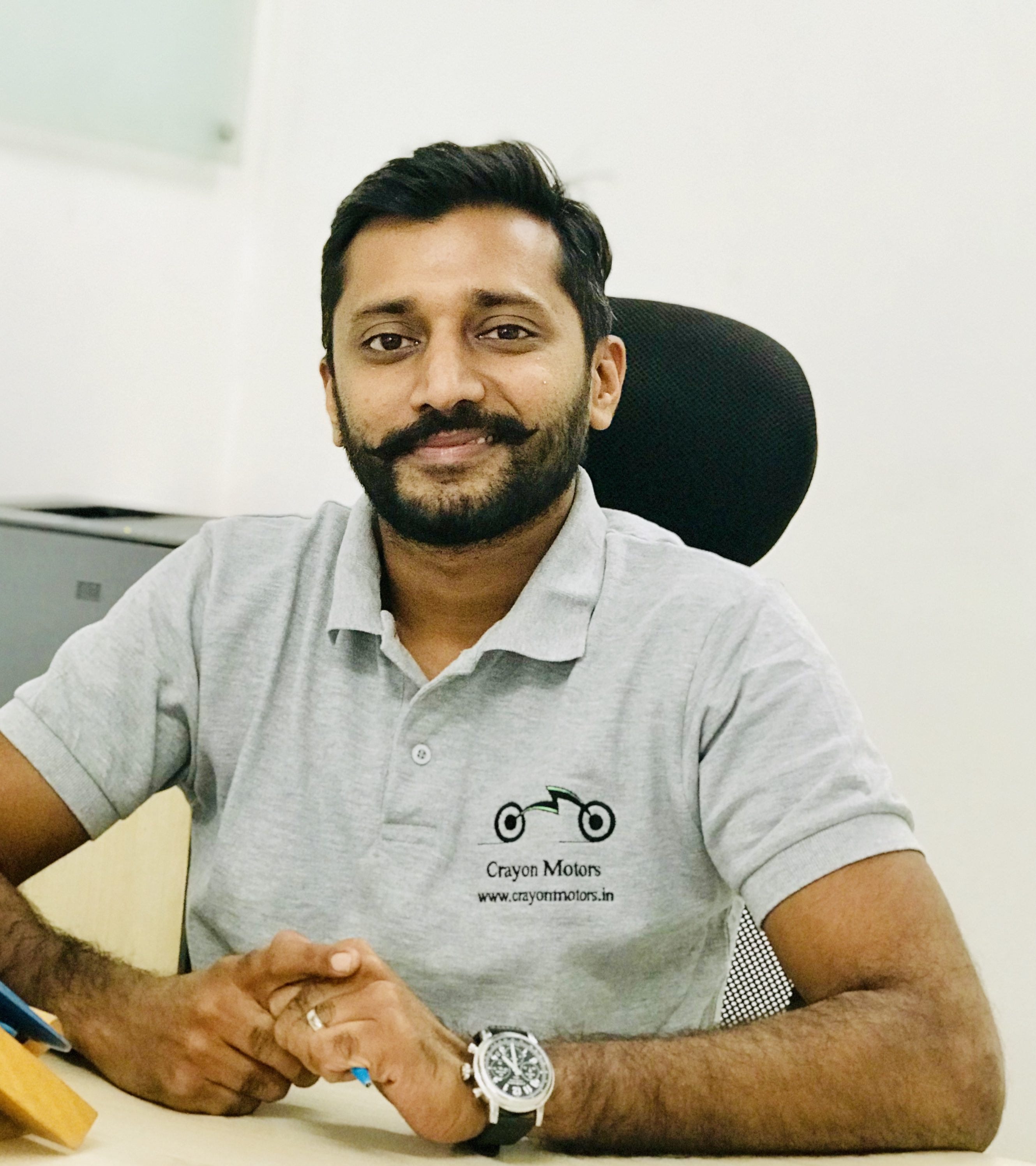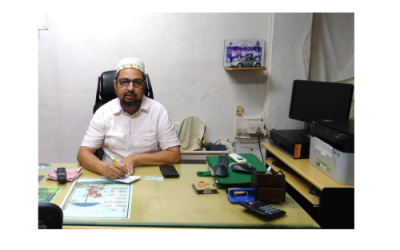Crayon Motors is an Electric Mobility Company which is a sister concern of M/s U.P. Telelinks Limited. It is successfully run by two brothers, Mr. Rahul Jain, an Engineer and a Management graduate from Manchester, U.K, and Mr. Mayank Jain, an IE MBA candidate who chose to build Crayon Motors instead.
In a recent interview with Mr. Ravdeep Singh Chadha (Editor-In-Chief of Auto Insider), Mr. Mayank Jain & Mr. Rahul Jain talked about their Mission, Vision, UpcomingOpportunities in the Electric Automotive Industry and some suggestions for entrepreneurs and start-ups.
Ravdeep: What products and services does Crayon Motors and UP Telelinks deal with?
Mayank: U. P. Telelinks manufactures electric three-wheelers, whereas Crayon Motors is a two-wheeler manufacturer. Presently, we make low-speed electric two-wheelers and have a product portfolio of about 4-5 scooters. We are continuously adding new products to the mix.
Crayon Motors is working through a dealer network which is widespread in various cities of India. We are actively participating in adding more dealers & distributors into our system. Besides that, we are also working in the field of shared mobility where we partner with companies and let the users ride our scooters through the platform of shared mobility. If the riders want to buy the scooters, then they can engage with us and buy them.
Under U. P. Telelinks, we are manufacturing electric rickshaws in the brand name of Singham. We are one of the first in India to get such a product approved by ICAT. It happened sometime in Feb 2015. The company has been in the field of electric 3-wheelers for five years now. Here again, we are working through a dealer and distributor network, which spreads across seven states right now with the addition of states in the future.
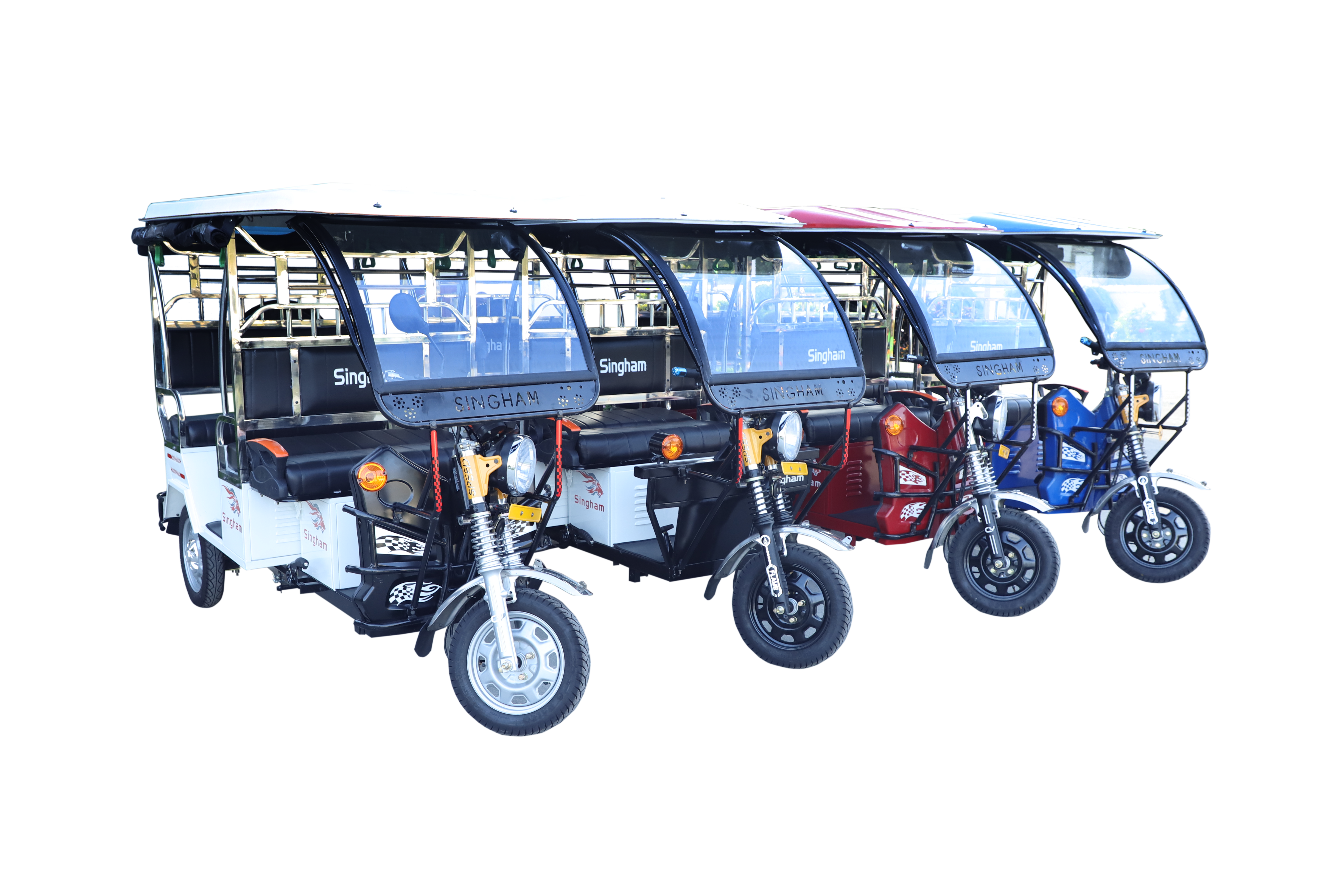
Singham Electric Rickshaws
Ravdeep: What is the number of employees and customers this whole company has?
Mayank: We have about 250 employees, and as the number of customers is concerned, it is tough for me to give the exact number because we have been in the field for so many years and over 10000 people are already using our products happily on the road.
Ravdeep: As it is evident that electric mobility is the next big thing, what is your vision for the company?
Mayank: As you rightly said, electric mobility is the next big thing, and we are actively looking at contributing to the field and becoming one of the leaders in the industry.
As far as the company’s vision is concerned, the company’s main objective is ‘Electric mobility for all’. We are looking at providing good quality, cost-effective products which are available for everyone.
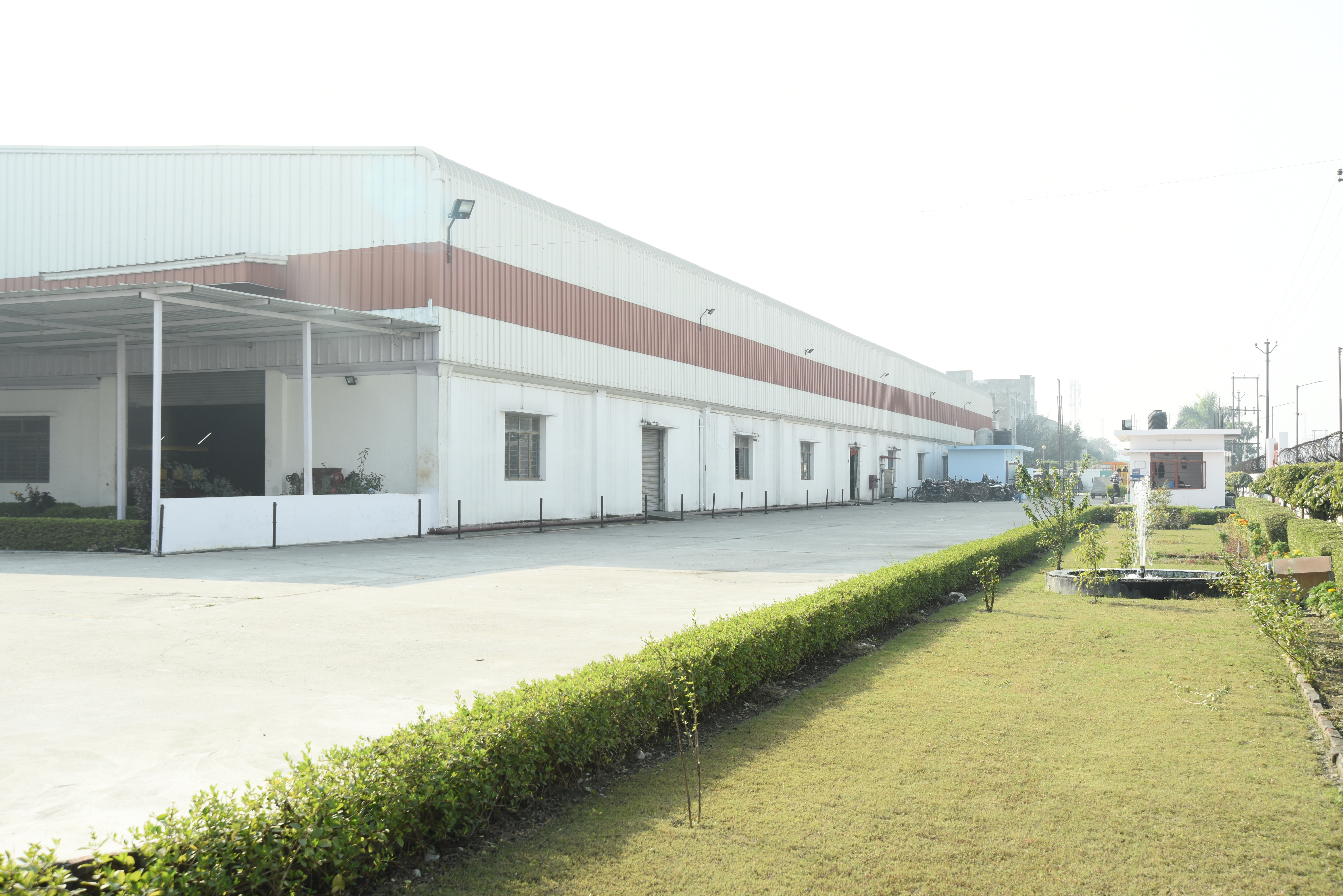
Crayon Motors Factory
Ravdeep: When did you start this business and how did you get into it?
The foundation for electric mobility was laid sometime in 2014. The reason for getting in this area of electric mobility has its foundation in my fondest childhood memories when I used to enjoy the winters outdoors with that slight chill in the air. This is impossible nowadays as kids are facing problems, across India in winter due to the poor air quality. People have to run away from cities during winters to breathe in clean air. The situation in summers is not better either. Even these days in Delhi, the AQI is terrible.
We wanted to contribute something towards cleaner air. We started by planting trees and grass in open areas so that the amount of dust in the air goes down. But these were all small steps. Something bigger was required. Our objective was to provide our future generations the same quality of air that we had the privilege of breathing. We thought, if everyone gets into the picture, then that may bring about a change. This idea led our entry into electric mobility.
Ravdeep: That is a great reason the cause you are willing to do for the society where you get a combination of a big opportunity as a result.
Mayank: We are always looking at going a step further, and that is one of the reasons why Crayon Motors is taking the initiative to plant a tree every time a scooter is sold and on behalf of the customer so that we can have a double impact on the environment.
Ravdeep: That’s great.
Ravdeep: Everyone has a high point and a low point in their life. So, what are the key higher points in your life?
Once we had decided to venture into this field, I scouted through the unknown towns and villages of China to find the ‘right-fit’ suppliers. After having done so, I returned home feeling triumphant, placing our first order for e-rickshaw parts. My first independent assignment.
When we heard the news of the ban on e-rickshaws, it felt like being struck by lightning.
It was a troubling situation, having already paid advance in China and invested heavily in the development of the product here.
Were we destined to succeed or fail?
The moment the new draft policies were released, we set out again. Rahul and I set responsibilities for ourselves and our team members. We redesigned our product while finding the right suppliers and sources. We were improving Singham every step of the way.
In the end, we managed to launch a better and government-approved version of Singham. With the help of our team, we set a record time for approvals for any e-rickshaw, to date, by a testing agency.
So as you can see, this journey is a great reflection of both the lows and highs of my professional career.
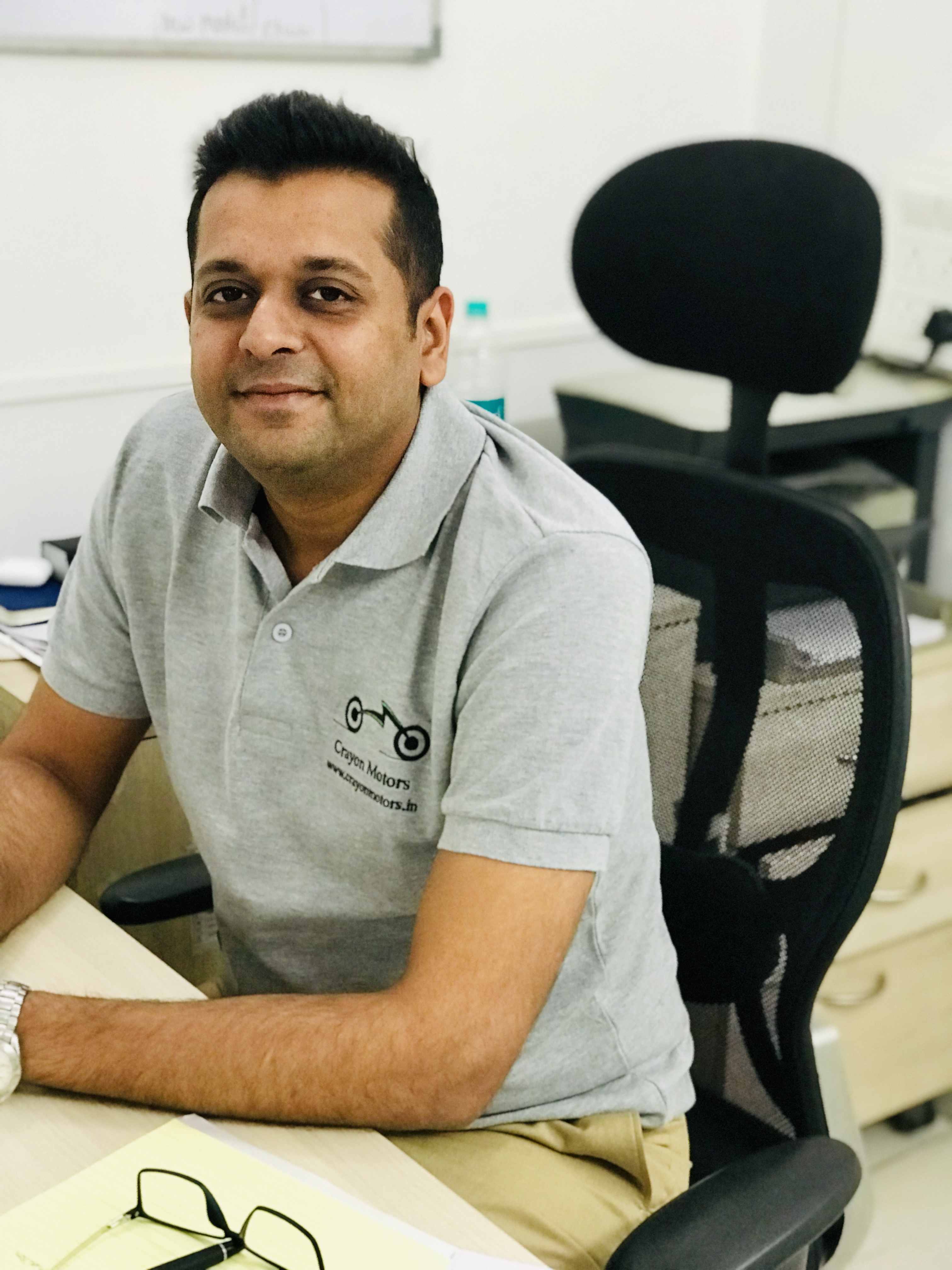
Mr. Rahul Jain
Ravdeep: Who are the 3 people who have inspired the most in your life?
Mayank: My father and my grandfather – They started their journey in a little known village near Delhi. Tackling the nuances of business, they were able to migrate to Delhi, along with the family. And today, they have provided Rahul and me with a base from where we can build and take up further. They have given us the confidence, persistence, and belief to hang on to something which we believe in and make something big out of it. I owe it all to them.
Secondly, I love sports and there have been several athletes whose lives have had a major influence on mine. Their life showcases the impact that persistence and dedication can have on one’s goals.
Ravdeep: I think Mr. Rahul would be one of the examples.
Mayank: He is my role model any day. The calmness and composure which he carries with himself and the humility he shows, the presence of mind which he has, are the things which I wish to learn. I think the significant part of defining me in terms of who I am today has a lot to do with him. He has always been a guiding force during my personal or professional breakdowns.
Ravdeep: The calmness which I can also feel when I am sitting beside him.
Mayank: As you may also have read on the Crayon Motors website where we have mentioned that Rahul Jain can bring a storm to calm. Every word of that is accurate.
Ravdeep: Everyone has good and bad in themselves. What people think is good and bad in you?
Mayank: I tend to be restless and very eager to know about things. There are times when it goes overboard. This habit is something that I am working on.
It is important in life to keep on introspecting, learning to be a better person. I am always endeavoring to imbibe these principles in my life.
I think it is imperative to be a team player to be successful and reach your objectives. No individual can be a master of everything and cannot achieve things all by himself. Having a team that is motivated and shares the same objective goes a long way in determining your success. One can only reach their goals if one transition from being a boss to being a leader.
The philosophy of how to approach things in life is something which I believe, or so I’ve been told, I am good at. One should always look for opportunities and explore them first rather than just writing them off. First, see and explore if it works for you. Then conclude. Please don’t jump to it. The right conclusion can only be inferred when you write it all down on a piece of paper and weigh the pros and cons.
Ravdeep: It takes a lot of energy to keep the electric mobility on-ground reality. What keeps your energy so high be it every day or every decision which you take in this business?
Mayank: My family’s support. You want to surround yourself with the right people. Be it your family or friends who encourage and support you.
I am a true believer in a healthy mind and a healthy body concept. If your mind is not fresh, your body will not feel it and vice-versa. I regularly work out and meditate, which gives me the energy to keep moving.
The industry is new, and there are many challenges. These challenges will bring various speedbumps, as well. I always believe that every speed bump leads to newer and bigger opportunities. Working through these speedbumps is also an opportunity to have an improved version of ourselves. This approach keeps me motivated.
I also read whenever I get a chance, which refreshes my mind.
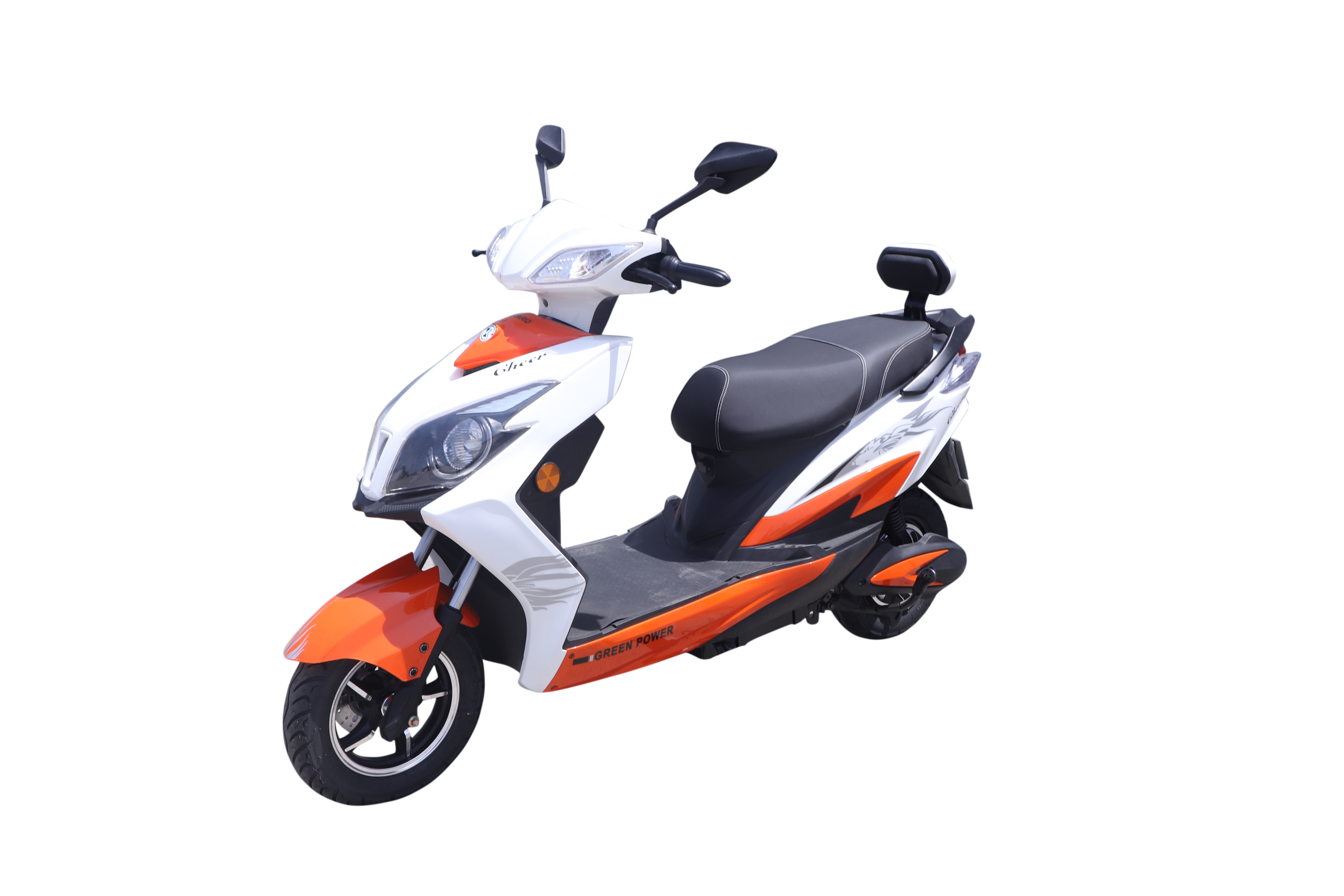
e-Scooter
Ravdeep: Any suggestion you would like to give the new-age entrepreneurs or start-ups who are just starting up?
Mayank: When you are setting up, you should always have a clear idea of what you are supposed to achieve. Any speedbumps which come your way until you achieve your goal is a part of the journey. Enjoy them! The more the speedbumps, the better it is for you. Treat every speedbump as an opportunity to learn something to take you to the next level.
Welcome your speedbumps and celebrate your success thereafter. Accept whatever life throws at you and work at it. Be ready to change your path, to face anything which comes your way; sooner or later, you will find success.
Be flexible in your mindset and approach.
Ravdeep: UP Telelinks has been a separate industry. Also how has been your experience to date in the automotive industry?
Mayank: It’s been fantastic. The automotive industry is exhilarating. There is a sense of pride you feel when you see products made by you functioning on the road right in front of you. It is something very different and delightful for us.
There are times when, after a hard day’s work, you are tired and cannot function. All of a sudden, you see your product right in front of you, a happy driver riding it or ferrying passengers. Such sights bring a sense of achievement. You are re-vitalized. You don’t have to go anywhere, see anything…it is right there for you.
The other products of UPTL are B2B. The feedback and the challenges we face are different. When the scooters or electric rickshaws are concerned, even though we are working through a dealer-distributor network, we get to hear the customer feedback a lot.
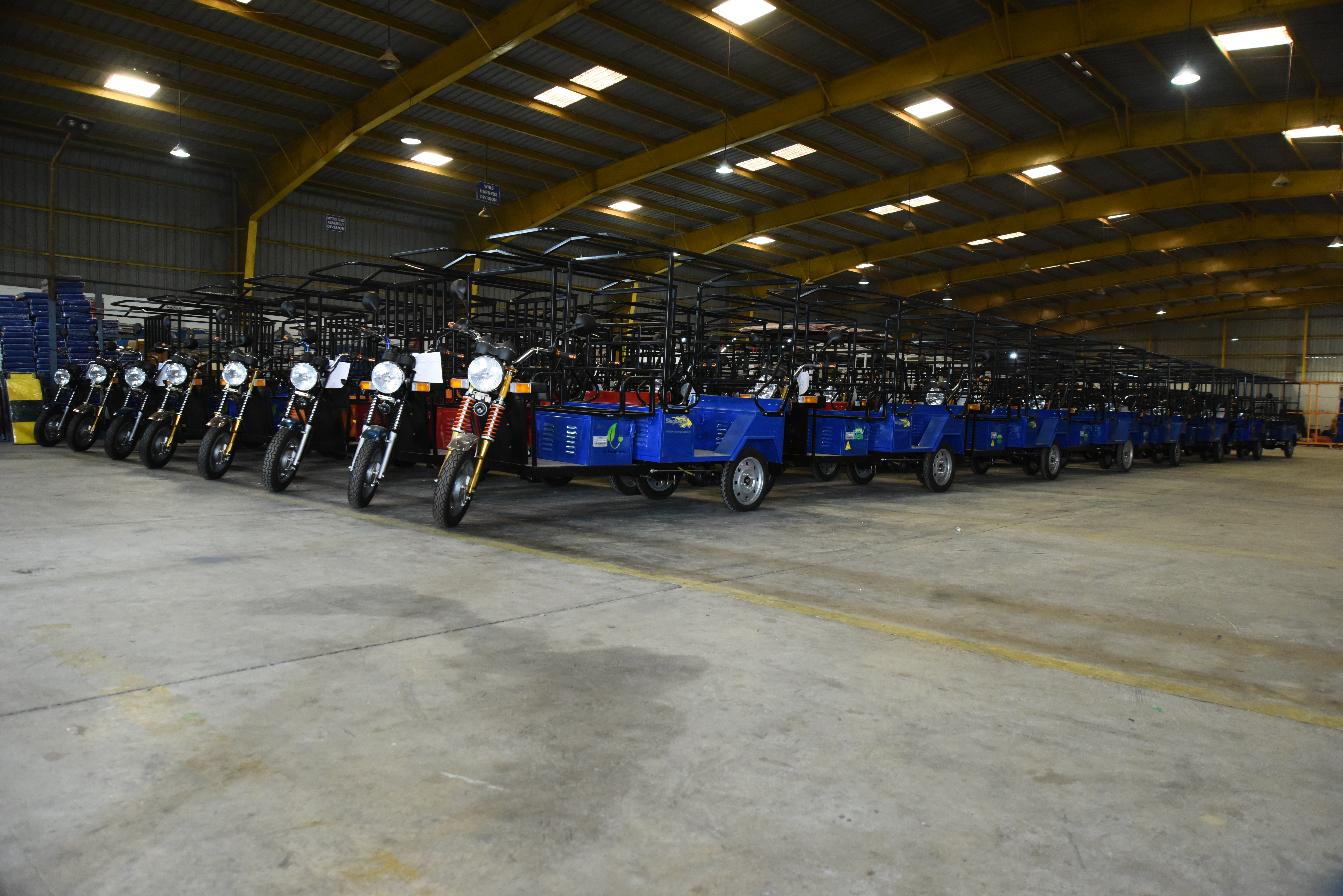
e-Rickshaws production unit
Ravdeep: How many dealers and distributors do you have as of now and what about the service centers? If anything goes wrong with the product, how does the customer reach you?
Mayank: For Singham, we have a dealer network of 50 odd dealers presently. We are actively adding more dealers regularly. By the end of FY20, we are targeting a dealer network of over 100. Our dealers themselves have the sales and service centers. So these 50 would have another 30-40 service centers to cater to the customers. The sales outlets provide service to the customers as well.
Besides the regular criteria, the main thing we look for in a dealer is that they have to be as passionate about EVs as we are.
Our objective is that our product should keep on running. We try to create hassle-free products, so we don’t encounter too many customer complaints. In the unlikely scenario of a breakdown, through our dealers, we ensure our customers are satisfied at the earliest.
We are all hands on deck kind of folks. In case any problem is reported to us directly, we undertake the quickest and best possible resolution for the same through our network.
For scooters, it’s a recent start for us. We already have a sales and service network of about 25-30 sales points. We are actively engaging more people to partner with us. We are targeting a sales network of over 50 dealerships by the end of this financial year.
Sales and servicing of scooter again be taken care of by the dealers. However, to better understand and service our riders, we are going a step further. The customers can post their complaints concerning the products on our website. With the help of our dealers, we shall work towards resolving the same. These inputs from the customers will be used to improve our products further.
About the Industry
Ravdeep: What’s your take on the rising competition? There are a couple of other companies that are into the e-rickshaw segment and scooters segment. Although they have not hit the reality, there is competition.
Mayank: There is massive competition, and it’s been there since we started. Our philosophy has always been believing in your product and continuously work towards improving it.
With competition, the most significant issues that come are pricing pressures. In this industry, some companies are willing to reduce the price of the product by degrading the quality. Something that we are ethically against.
A product running on the road is bound to go through wear and tear. Unable to meet their commitments, these companies come and go. Such scenarios cause many problems for companies, like UPTL and Crayon, dealing with quality products, in the short term. The same is the case for scooters as well. As always, we work towards providing the best vehicles. By being basic, by being right and not compromising on the quality.
Over time, we have seen Singham as a brand become synonymous with quality. The areas we are present in, we are the market leaders because of our quality products. This is what we aim to achieve for Crayon as well.
The fact that we have some of the strongest financial tie-ups for the end customers plays a crucial role in establishing our position in the market. As of today, we have tie-ups with some of the biggest PSUs and NBFCs in the country.
We are in it for the long-term, and that takes time. We have to be consistent, smart, and not compromise on quality. That is how we are approaching this industry.
Eventually, what you will see is, especially in the two-wheelers, where the customers are a lot more vocal as compared to the three-wheelers. The lower quality competition will automatically disappear.
Ravdeep: Does the slow-down in the auto industry impact the E-Rickshaw segment?
Mayank: E-Rickshaw segment has its ups and downs, which is a lot more to do with the regulatory scenarios in specific states or cities. I believe the auto sector does not impact us. Ours is a commercial product and used for the last-mile transportation of people or goods. So it is insulated for many reasons.
In the case of scooters also, we are in a transitional stage from ICE to electric, so the industry by itself is insulated to auto slow-down.
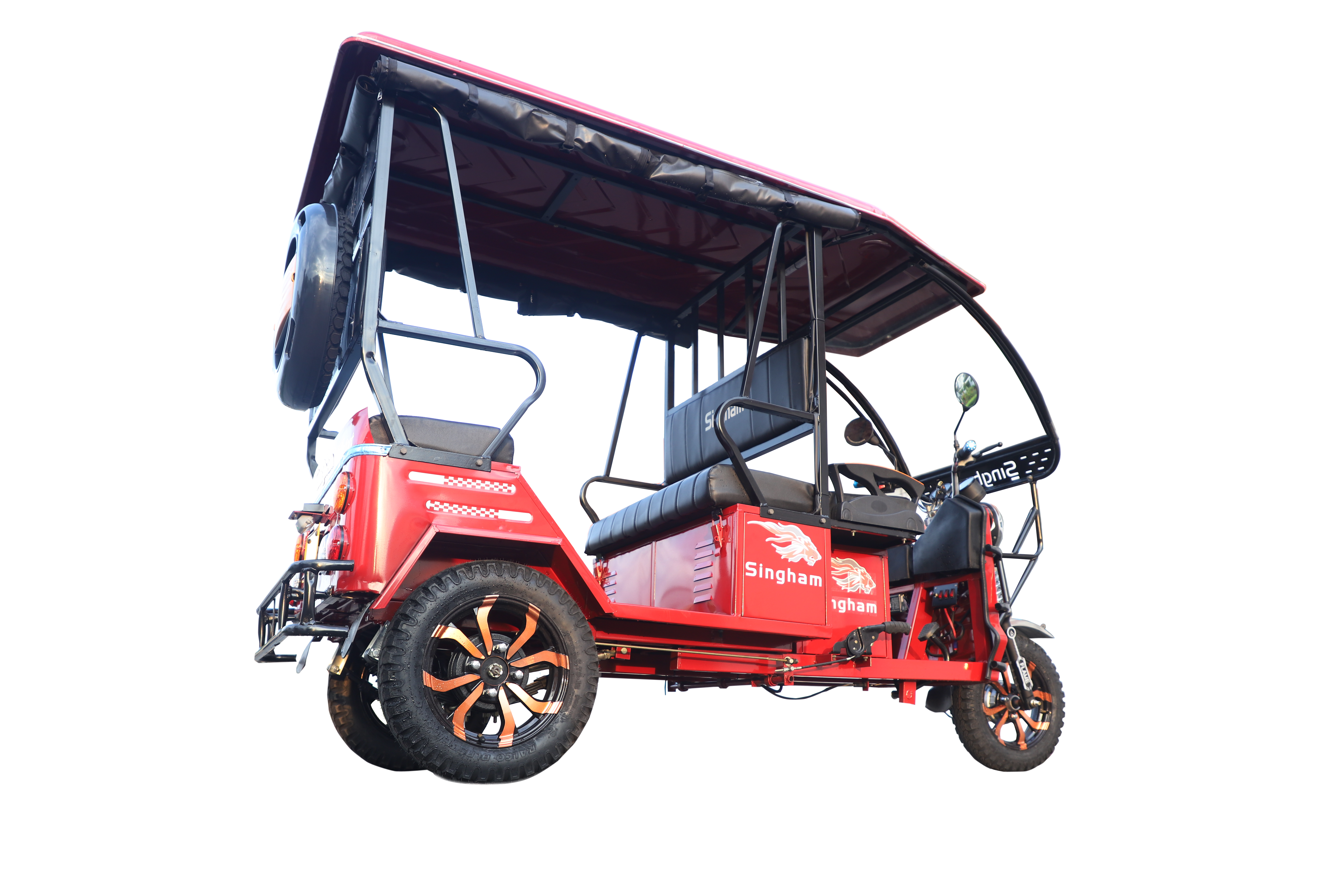
e-Rickshaw
Ravdeep: We have learned that the slow-down in the auto industry is also because the noise of electric mobility has started. The transition has started. Do you think this as a positive sign in your business?
Mayank: A lot of transition is from the ICE towards electric, at least with the two-wheelers. We do not require infrastructure such as charging stations. Our electric scooters are as simple as charging a mobile phone. Being infra-light is something that I believe is a positive point for us. So, it is a lot easier to make that transition. It is not only happening in bigger cities but also in smaller towns where people are looking at owning these products. I view this as a positive sign.
Ravdeep: Is GST good or bad for electric vehicles?
Mayank: GST is both good and bad. For Customers, it is good. The govt recently reduced GST on EVs from 12% to 5%. As a policy matter, our company has passed on the full benefit of this reduction to our customers. For Manufacturers, however, the input GST rates are higher, leading to an inverse tax structure. Our money is blocked in the form of refunds, increasing the requirement for working capital. But let’s see how the industry will cope up, maybe they will reduce the GST sooner.
Ravdeep: Will China control the Electric Vehicles part as it has a stronghold on the Lithium battery?
Rahul: Recently, India signed an MoU with Bolivia to secure supplies for Lithium. Similar discussions are ongoing with other countries. Very soon, India will have giant manufacturing units for Lithium batteries. In that way, we will be able to reduce our dependence on China for lithium batteries.
Competition from China is always there for any manufacturing industry. But our Government is looking at a huge future for electric mobility. We stand firmly with them.
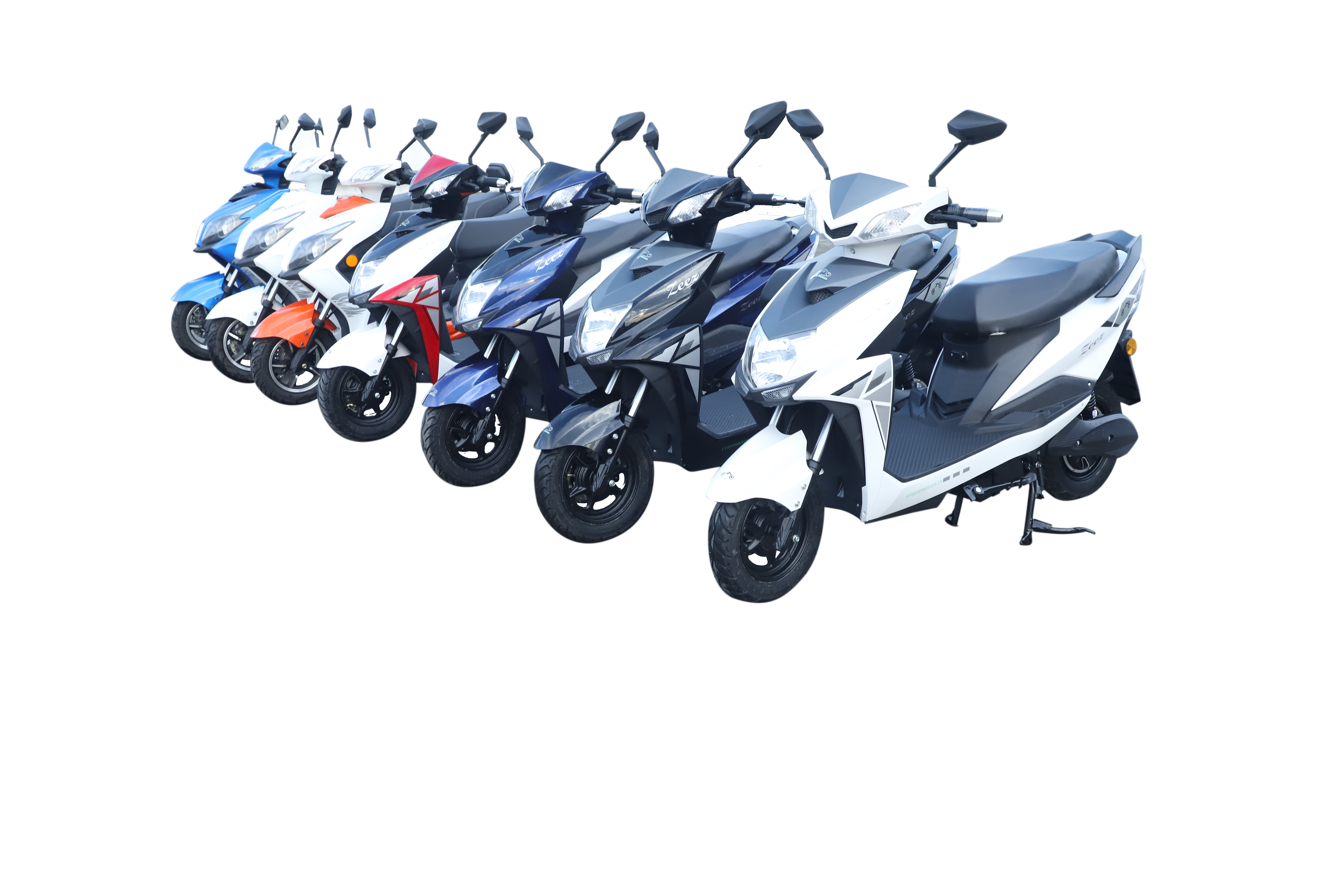
e-Scooters lined up for sale
Ravdeep: Can you tell us more about swapping stations? What is a swapping station and how will it work in India?
Rahul: Battery-Swapping stations, just like petrol pumps, will be available at various locations. The user has to pay as per their use. There will be charged batteries at these swapping stations. If a customer is running out of battery, he can go there and replace his discharged battery with a charged one.
It’s pay as per your use. There is a possibility that if we take the battery out of the equation, then the electric vehicles will become much more attractive because batteries cost approximately half of the total vehicle cost. Rather than investing day one on the battery, this will be like a petrol bank. Even then, the cost of running that product will be cheaper than running a fuel-based scooter — cost-effectiveness for the users.
Ravdeep: What vision do you see in the next three to five years?
Mayank: We have a lot in the pipeline over the next few years. The company is committed to investing over 100 crores in the field of electric mobility in this period. Our primary focus shall be on localization, new product development, and infrastructure.
We want to offer the best products as per our market requirements. We are looking to build a pan-India network and getting the right financial tie-ups, in addition to the ones we already have, to assist the end customer. For scooters, we are offering EMI solutions from over eleven banks and NBFCs. We are also in the process of launching FAME compliant vehicles.
We are tying-up with a lot of field operators, field managers, portals, delivery networks. Even on the ride-sharing platforms, we are in discussion with one of them, and our product is in testing. We are looking at the market very positively and are also exploring the possibility of getting into the leasing part of it.
As you understand these take time.
Government policies are very favorable for the industry in general. Our dream is to grow as a national player.
Within 5 years, we aspire to be a national player in this segment and want to open at least two new manufacturing units at least one in the south and one in the west.
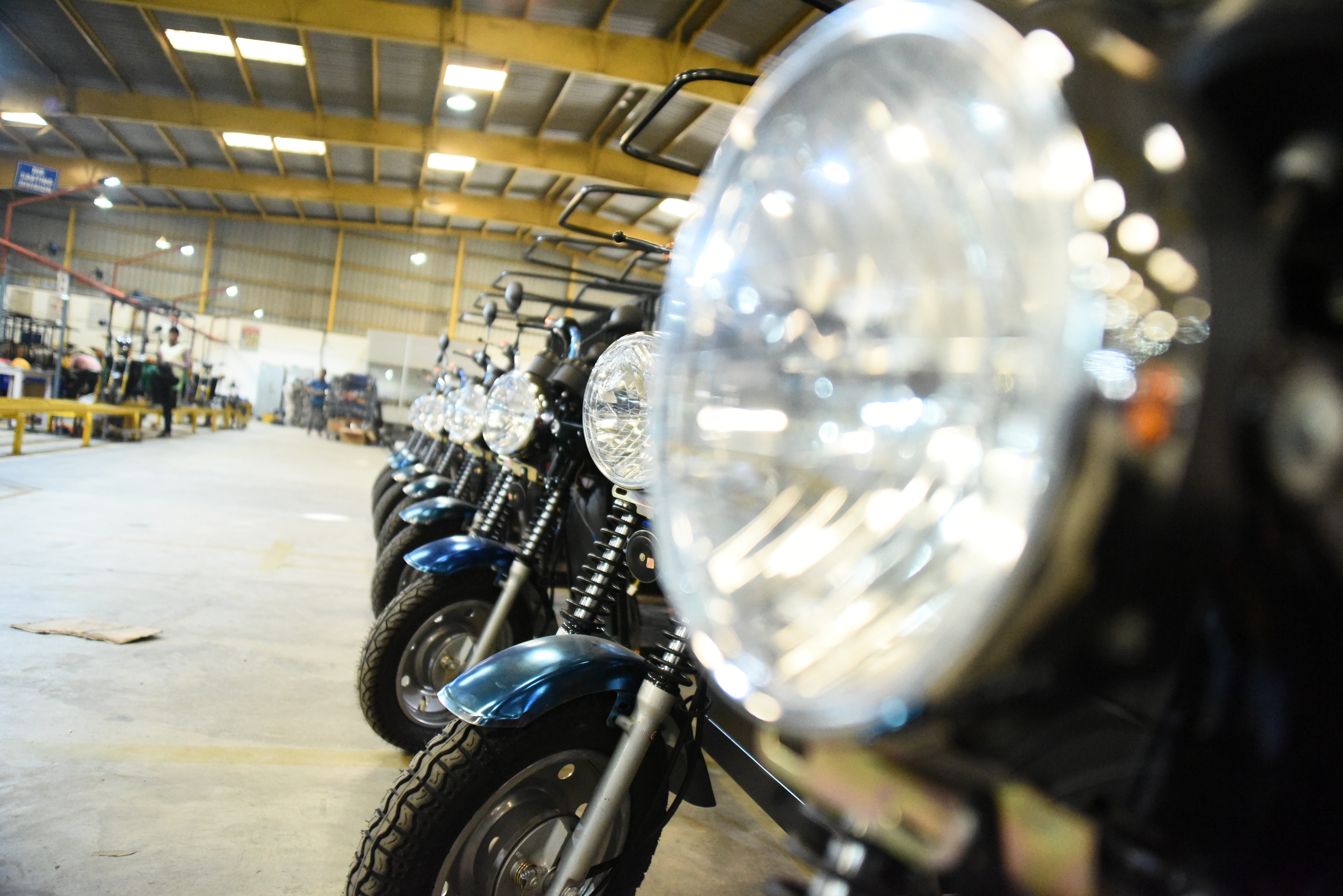
Singham e-Rickshaws
Ravdeep: Have you moved to the scooters because the electric rickshaw is very successful and you were confident about your move?
Yes, it was also about finding the right time for it. E-rickshaws have been successful, and we intended to replicate the same for two-wheelers.
Two-wheelers are mostly for personal use as they account for maximum sales, so if we get this right, then maximum pollution can be controlled as well. Saving the environment is a goal which is very close to our heart and we want our actions to speak louder than our words.
1